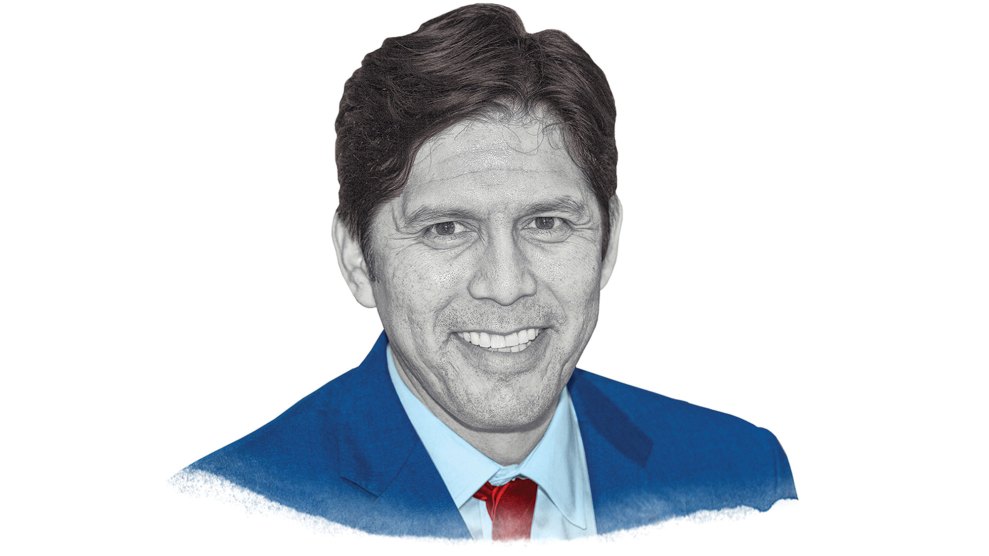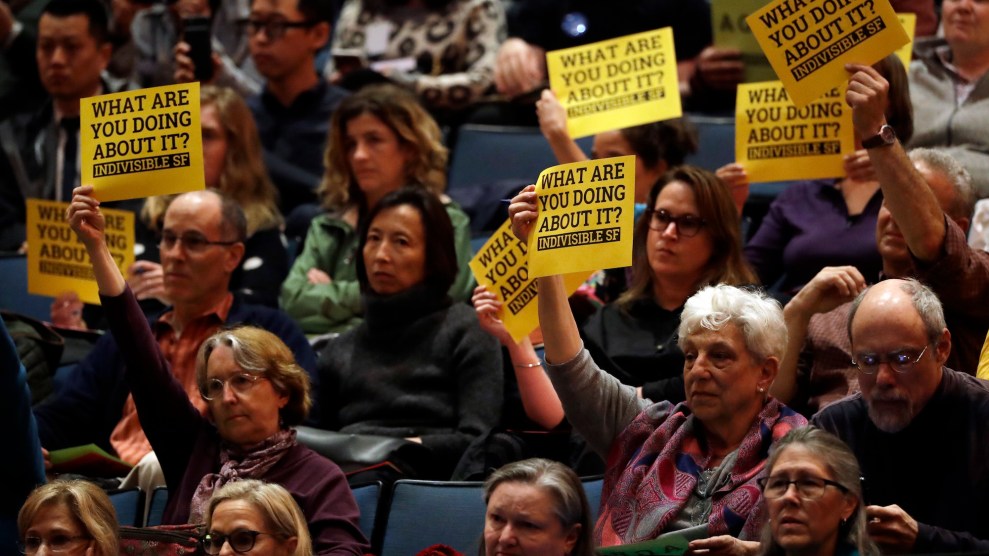On Saturday, the leadership of California’s Democratic Party endorsed state Sen. Kevin de León in his campaign to oust Sen. Dianne Feinstein. It was an upset—not least because Feinstein has been in office since 1992. She won 44 percent of the vote in California’s primary election in June; de León trailed in second place with 12 percent—not a great showing, but enough to qualify for the November ballot under the state’s top-two primary system. The new endorsement promises to heat up an already contentious race between the two Democrats.
Some in the party worry that de León’s campaign as a progressive challenger will split their base just before a crucial midterm election. While she remains the front-runner, the 85-year-old Feinstein has dug in her heels to keep her seat for a sixth term. She has hedged a number of her long-time positions on issues like capital punishment, recreational weed, and fracking, and had urged the state Democratic Party not to endorse any candidate in her race.
The 51-year-old de León is a veteran legislator and the state’s most powerful Latino politician. He recently served as the president pro tempore of the California Senate, where he shepherded the California Values Act—the so-called sanctuary state bill. He got his political start organizing immigrants’ rights marches in the 1990s, back when California voters passed Proposition 187, which banned undocumented immigrants from using publicly funded services such as schools and hospitals. (It was later found to be unconstitutional.) De León draws parallels between the current wave of anti-immigrant sentiment and the one that arguably marked the beginning of the end of California being a red state. “It doesn’t turn out well for the Republicans,” he told me last year.
But now he’s turned his fire on Feinstein. De León recently sat down at La Carreta in East Los Angeles for a conversation over a habañero-infused breakfast. There, he made subtle digs at the senator’s wealth, describing her as a billionaire before adding, “It is what it is.” (Her most recent financial disclosures put her net worth at $79 million.) He also doubled down on his contention that Feinstein has been “anti-immigrant,” noting her 2006 vote to build 700 miles of border fence—which he called a wall.
As he dug into a plate of huevos con nopales, de León made his case for shaking things up in California and in Washington, DC. “We have to disrupt the status quo,” he said. “You can’t push the envelope. You have to take the envelope and tear it apart.”
Mother Jones: Why are you running this race at this moment?
Kevin de León: I’m running to have the opportunity to lead, and because I think it’s time we have a real debate on the issues and values and priorities that we care deeply about as Californians. These are trying times in our nation’s history that I think are very dangerous times. We’re obviously seeing how polarizing, how polemic, how controversial and, quite frankly, how racial it has become. I never thought in my wildest dreams we would actually be witnessing any presidential administration, in this case a Republican administration, targeting and using immigrants as scapegoats for their own political and moral objectives.
MJ: The news cycle has been focusing closely on the southern border. But it’s not only the Trump administration’s fault. We’ve teetered on a slippery slope for a while, and now we appear to be sliding down it.
KDL: Not to this scale. Not to this level of inhumanity and brutality. There has been separation of children from their parents in the past, but nothing like this. These are edicts from Homeland Security and the Department of Justice to have a zero-tolerance policy regardless of the human consequences on these young children. I’ve never seen it at this massive scale, and this very systemic targeting via these edicts from this president to brutally and inhumanely tear apart these families by ripping babies from the arms of their mothers.
MJ: What do you think Sen. Feinstein’s role in this has been?
KDL: I think for a very long time, the incumbent senior senator from California has had an anti-immigrant record and used anti-immigrant rhetoric. And that has helped feed this anti-immigrant hysteria at a national level for a very long time—voting for a wall back in 2006, before Donald Trump entered the scene.
I take a different perspective as the youngest child of a single immigrant mother with a third-grade education, a woman who worked her fingers to the bone in very wealthy enclaves near San Diego. It was there in mansions overlooking the Pacific that my mother spent the vast majority of her days and her life cleaning up other people’s homes, and it was there I learned the value of hard work by watching my mother’s ethic. She didn’t have access to venture capital for a startup that would potentially change the world as we know it. But she changed the world in the sense that I was born from her, and I became the only person of color in 133 years to lead the California State Senate.
By no stretch of the imagination have we always been perfect in California. But this is how we evolve as a human society, how we attempt to correct the wrongs, and this is why I feel strongly that California needs different leadership and needs change. It needs a different voice representing them in Washington.
MJ: I’m sure as you’re talking to voters that you’re finding they have views not reflected by the two main parties. Do you see the Democratic Party being responsive to these nuances—the Trump supporter who supports single-payer health care—that don’t fit into the binary?
KDL: Poverty is poverty. Everybody wants higher-paying jobs. Everyone wants the opportunity to send their kids to college. Everybody wants access to health care. In the wealthiest nation, having no access to health care shouldn’t bankrupt your family. That’s just the bottom line. The old paradigm—the binary perspective that you just articulated—I think things are sort of fluid and dynamic. When I move my policies, I don’t single out just Democrats, those who read Mother Jones.
Every resident of California deserves dignity and respect. That includes the Trump supporter, for whom there may be lot of economic anxiety, economic panic, economic low self-esteem. But the completely understandable sense of desperation about “How am I going to take care of my family?” gets packaged, sold by shysters who come in and say, “Your economic plight is because of those individuals who look different from you, and they are why you’re unemployed or underemployed.” At the end of the day, it’s about opportunity. That’s what people want, and right now we have a system that’s rigged against the majority of Americans.
We have the same interests whether you live in western Kentucky or in the Central Valley. A problem we have now that overlays these deep-rooted fundamental economic problems is a cultural war that says, somehow, some way, if the border wall is built, that will be a panacea of every economic and social ill. It won’t be. Border crossings are at a 50-year low. Why waste $25, $30, $50 billion of taxpayer money to build a wall that is not needed when you need it in middle-class America?
MJ: What’s the best way to build broad coalitions across different identities and demographics to realize a common political goal?
KDL: We have to tear down these metaphorical walls between communities who have so much more in common than they realize. We have an administration that’s trying to build a literal wall and is asking some Americans to buy into an idea that just imprisons us in our own communities and neighborhoods without reaching across to other Americans. We all want the same thing for our children, whether it’s good health care, a high-wage paying job, access to higher education without being saddled with college debt. And I think we all want a green economy. These are the policies that can unite the country.
I am incredibly, incredibly optimistic and hopeful for this country, for our state, because this still is the greatest nation in the world because it is a beautiful mosaic. It is an amazing tapestry of humans and ethnicities from around the world. In California, we don’t ban our diversity, we don’t deport our diversity, and we sure as hell don’t wall it off.
MJ: A lot of people have compared you with Sen. Bernie Sanders in the Democratic presidential primary and said that your campaign may help Sen. Feinstein see things in a different way. Do you think that’s a fair assessment?
KDL: It’s not about moving the senior senator more to the left; I’m moving her to the light. I don’t besmirch the senior senator from California for being one of the wealthiest members of the Senate, or for being a billionaire. It is what it is, and that’s her background, and where she comes from. I’m the youngest child of an immigrant mother with a third-grade education. I grew up in poverty, and my situation is my situation. Am I unique? By no stretch of the imagination, not an original story. I shouldn’t be critiqued for my situation, I don’t critique her situation. It is what it is. But, our two perspectives, the way we view things, our prism, our outlook, you know, informs our policymaking decisions. And that’s why I think the contrast is huge.
MJ: You say the status quo isn’t working. What has kept us from shaking it up?
KDL: It’s the lack of courage and leadership in Washington. You have a very strong, politically powerful lobby that’s doing everything in their power to thwart and undermine any of these types of policies that would really bring equity to American households across the country. They’re not going away. So, the question is about political leadership and political courage. That’s what’s lacking.
Like on immigration reform: You have a Congress that has not been able to, doesn’t have the capacity to, or simply doesn’t have the desire to move forward with sensible, comprehensive immigration reform. It’s been done in the past in a bipartisan fashion, with Ronald Reagan as president and Tip O’Neill as speaker of the House. There’s plenty of blame to go around in Washington, which is why you have so many states, like Alabama, Texas, and Arizona, manifesting their own pseudo-immigration policies because of the ineptness and the dysfunction of Washington.
MJ: How do you stay optimistic?
KDL: If I wasn’t an optimistic and idealistic person, I’d get out. When I see the most marginalized and most vulnerable being targeted and scapegoated, when I see middle-class folks barely holding on, and when I see people in the lowest economic strata not being able to climb up that ladder because that ladder has been taken away completely from them, it gives me the passion. That passion stays in me to fight for them. You can be a Trump supporter and I’ll be fighting for you, too, because I can guarantee that man isn’t going to deliver on any promises—and you do deserve access to health care, to breathe clean air and drink clean water, and you do deserve to have a high-wage paying job.
This interview has been edited for length and clarity.

















